-
What We Do
- WHERE WE WORK
-
About Us
 Welcome Message from Carol Jenkins
Welcome Message from Carol JenkinsFor more than 90 years, World Learning has equipped individuals and institutions to address the world’s most pressing problems. We believe that, working together with our partners, we can change this world for the better.
On my travels, I’ve had the opportunity to meet with many of those who have joined us in this mission. In Baghdad, we’ve trained more than 2,300 Iraqi youth who are already giving back at home. In London, our partners in the TAAP Initiative strongly believe that we are all responsible to practice inclusion. And in Vermont, our Experiment in International Living and School for International Training participants prove every day that they have the tools and the determination to change the world.
Please join us in our pursuit of a more peaceful and just world.
- Get Involved
Media Center > Story
3 Big Ideas World Learning is Thinking About in 2019
February 1, 2019
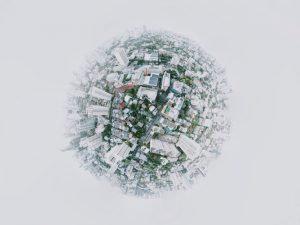 Global challenges seem to become even more complex with each passing year. Addressing them requires innovative and evidence-based solutions. That’s why World Learning is constantly reflecting on what works — and what still needs to be done — to address challenges like security, economic stability, and social inequity.
Global challenges seem to become even more complex with each passing year. Addressing them requires innovative and evidence-based solutions. That’s why World Learning is constantly reflecting on what works — and what still needs to be done — to address challenges like security, economic stability, and social inequity.
You could say we’ve learned a thing or two in our 86 years of experience. Our programs connect young people and adults to new cultures, careers, and education and entrepreneurship opportunities. We partner with governments, schools, and individuals to develop future leaders who have the skills they need to drive change. Our work marries the best of theory and practice in collaboration with our sister organization School for International Training, an accredited academic institution and pioneer in experiential learning.
In 2019, we’re making bold plans as we continue to tackle the world’s complex challenges. Here are three big questions we’re asking ourselves this year — and how we plan to address them:
1. How do we equip the youth of today with skills they need to be the business, civil society, education, and government leaders of tomorrow?
Young people need a broad set of skills to compete in a rapidly changing world. STEM education is critical for young people pursuing careers in a tech-forward society, while English is the default language of STEM and other professions. Soft skills like leadership and communication will help young people find and keep jobs. And, before they can do any of that, they need a strong foundation in reading, writing, and math.
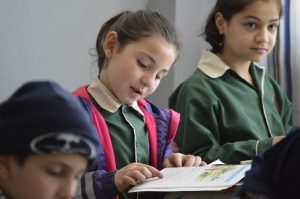
But, too often, poverty and inequality make it impossible for young people to attain those skills. The average student in lower-income countries performs worse than the 5th percentile in higher-income countries. Many of these children drop out of school between grades 4 and 8 to work for their families. Even if they stay in school, they fall years behind their peers in learning basic math and literacy skills. They have little hope of competing in a 21st century workforce.
“We have to work on the foundational skills if we want kids to prepare for the 21st century. Literacy and numeracy help them gain the fundamental skills necessary to succeed in life,” says World Learning Director of Global Education Rajani Shrestha.
World Learning works to mitigate some those challenges by cultivating teachers and mentors, establishing career centers, introducing cutting-edge technology in schools, and more. But there’s still much to be done. In 2019, we are going to continue to push education forward by:
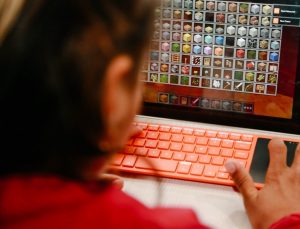
Encouraging communities to invest in education: Communities play a critical role in a child’s education. In Pakistan and Lebanon, we’ve learned that involving the community through parent reading circles and other activities makes a difference. This year, we’ll be using the USAID toolkit to promote literacy for learners with disabilities, helping students from all backgrounds overcome barriers to learning. As part of that process, we’ll be building awareness within communities about those barriers and bringing in family members to serve as partners to their child’s education.
Integrating technology into our work: Technology can make a real difference in a young person’s education. World Learning uses virtual learning platforms to reach those who might not otherwise be able to participate in our programs. We also train young people and adults in how to use technology, which helps them compete in the modern workforce. In 2019, our Kids Can Code program will be working with children in a refugee camp in Iraq to help them learn to code, all while developing their basic literacy and math skills.
Developing 21st century skills right from the beginning: Success starts with the earliest days of a child’s education. You can’t learn to code if you’ve never been taught to read or do basic math. This year, we’re focusing more on teaching foundational skills in early grades. In Lebanon, for example, we plan to scale up what we’ve accomplished under the Quality Instruction Towards Access and Basic Instruction (QITABI) project, creating more opportunities for young people to learn foundational skills that will lead not only to their individual success but to the resilience of their communities.
2. How do we contribute to inclusive and resilient communities?
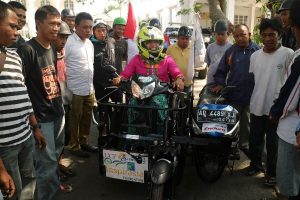
Strong communities are an antidote to violent extremism. World Learning takes a holistic approach to building communities: We strengthen educational systems, equip young people with the 21st century skills that lead to better opportunities, encourage them to get involved in their communities, and connect them to peers across the world in our people-to-people exchanges.
But it’s also critical to make sure everyone in a community is heard and valued. Through our Transforming Agency, Access, and Power (TAAP) initiative, we are ensuring that our development programs — and those of our partners — amplify the voices, opportunities, and dignity of all people. In 2019, we will:
Build the TAAP Community of Practice: Launched in 2018, the TAAP Community of Practice brings the international development community together to exchange ideas and ensure our programs aren’t leaving anyone behind. This year, World Learning will continue to nurture collaboration and build a robust community of like-minded development practitioners. (Join us!)
“The TAAP training at World learning changed the way I work and perceive my work. Before the training I thought my organization did great work and included everyone. After I took the training, I understood that including people with disabilities is not enough to claim full social inclusion. I had to ask myself — what am I including them in? Is this addressing their need comprehensively? And most importantly, who am I excluding unintentionally?” — Stella Su Sui Glan, Burmese TAAP Training Participant
Extend training opportunities to greater swaths of society: Transforming a community requires input from all its members. World Learning regularly looks for ways
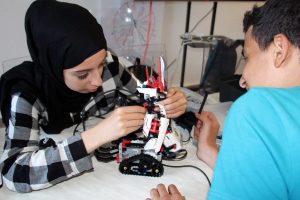
to include new people in our programs and, in 2019, we’re extending our reach in Kosovo, where we’ve worked for years to support higher education through academic exchanges to the U.S. for Kosovars as well as exchanges bringing U.S. teaching faculty to Kosovo. Now we’re launching a new program offering customized exchanges for professionals in fields from medicine to arts education — even more people will have the opportunity to share best practices and build their networks.
Promote inclusive learning techniques: Inclusion is critical in the classroom, too. In Algeria, we’ve been working with teachers and mentors at our STEAM Center to design lessons that are accessible to people with disabilities using a framework known as the Universal Design for Learning. World Learning plans to expand our use of this framework throughout our activities, whether we’re showcasing World Learning Algeria’s work at the UDL International Research Network Summit in March or using the USAID toolkit to promote literacy for learners with disabilities in our basic education programs in Lebanon and Pakistan.
“Universal Design for Learning tries to reduce the barriers of a lesson. How do I teach anything in the STEM fields and remove barriers for people? Maybe those students can’t write but can they build a robot. Or maybe it’s somebody living in a rural village who doesn’t have a background in a scientific field, how do I remove the barrier so that they can access this? That’s where we’re seeing the most satisfying success.” — Leah Bitat, World Learning Algeria Country Representative
3. How do we develop partnerships for sustainability and self-reliance?
It takes the sustained efforts of many to create a more peaceful and just world. When our development and exchange programs end, we rely on our partners and alumni to carry forward what they’ve learned in their communities. We’ve seen some pretty amazing things happen when they do, from declining school dropout rates in one Mexican community to a growing interest in STEAM fields across Algeria. In 2019, we will:
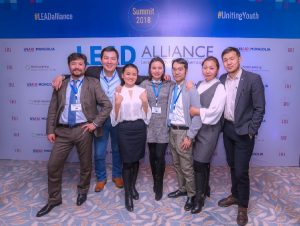
Continue to nurture our network of alumni: World Learning has seen the amazing things our alumni can do when they’re equipped with the right skills. That’s why we offer grants, further training opportunities, and a link to our global network to help them create change. Alumni from the WiSci Girls STEAM Camp hosted a series of women’s empowerment workshops in Ethiopia. And, our Leaders Advancing Democracy (LEAD) Mongolia program has launched an alumni association, registered as an NGO, that we know will flourish in the coming year.
Support our partners as they take ownership of our practices: It’s not just our alumni who learn from our programming. We share best practices with our partners and community stakeholders across the world so that they can continue to drive change. This is especially evident in our literacy work in Lebanon, where we have worked with the Ministry of Education to build their capacity to assess student performance. The ministry has taken ownership of that process and, in 2019, we’re working with them to develop a comprehensive strategy that will inform the design and implementation of a national system for student learning assessment.
World Learning looks forward to taking on these questions and more throughout the year ahead — and sharing our efforts right here on this blog. Follow along and join us in our mission of creating a more peaceful and just world.





